More and more people are seemingly turning away from the long outdated thesis that water
in the past, especially during the European Middle Ages, was generally bad, unhygienic, and not drinkable.
The poor water situation was often used to explain why alcohol usage, typically beer and wine,
was supposedly so high, they had to drink beer because the water was just too infested with
dangerous bacteria! Unfortunately, this argument is still used in some of the more popular
‘documentaries’ and ‘history’ videos on Youtube, many of which have millions of views.
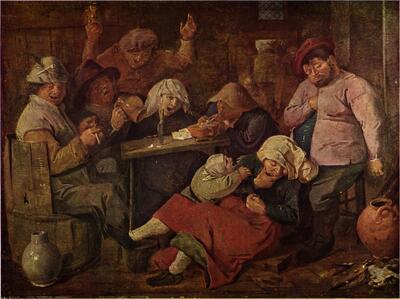
While this idea is still very much ingrained in many people’s heads (ask your friends or family members about whether they think people drank lots of alcohol and why that was the case) we see more and more articles trying to rectify this myth. (Just search for medieval water bad in Brave Search, DuckDuckGo or Startpage/Google)
Since this has been thoroughly debunked (And there wasn’t much to debunk — evidence for this
supposed wide-spread alcoholism was barely existent anyways)
I won’t go much detail here.
Rather, I will entertain the question: “What was the purpose of wine, beer, and spirits and what did they drink”
Taste
A Novel Concept: People in the Past Liked Tasty Things
The most obvious is of course taste. People liked the taste of beer, ale, wine, and such. There are people nowadays who can’t even drink only tap water or still water. Even if they drink only water, some have to drink some sparkling water in between. And then there are people who drink all kinds of tea, coffee, hot chocolate, fruit juice, soft drinks, etc. In the modern world, we have a ridiculous amount of options when it comes to getting our daily water intake on a regular basis.
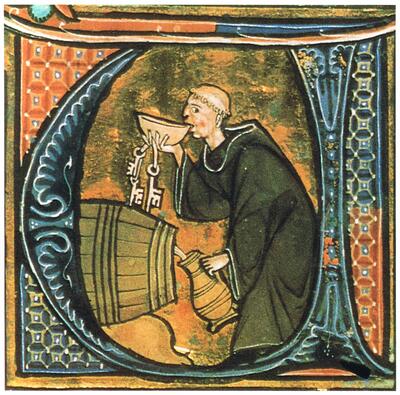
Depending on when and where someone lived in the past, they had fairly few options: clean water was an obvious one (societies usually don’t grow when there are no clean water sources nearby) hot chocolate with chili in central and south America, coffee from the early modern period onward, tea in large parts of Asia (there is very little evidence for tea up to the early modern period in Europe) and, of course, wine, mead, beer, and ale.
What Were Some Options in Europe Before the Early Modern Period?
Getting tired of drinking only water? Just mix it with some wine like the Romans. perhaps add some honey to get mulsum. Alternatively, if you don’t want something alcoholic, you could just mix vinegar with water to get posca. (Personally, I like some balsamic or grape vinegar with water during hot summer days).
Or if you’re not a fan of wine, perhaps drink some weak beer (as low as 1%-3% ABV). Or perhaps mix it with water to make it even weaker?
Want something sweeter and spiced? Drink some hipocras — you can even drink it warm it up during cold winter days. Does that remind you a bit of Mulled Wine or Glühwein?
You want something sweeter? Perhaps some electuarium, a thickened fruit-juice-honey mix made with all kinds of fruits and whichever spices you had available (though not necessary), dissolved in your wine or water might suit your taste.
Water and the Wooden Container Problem
This might be less obvious or known to the modern person who grew up with glass bottles and
fresh tap water, but wood actually changes how water tastes.
Leave water in a wooden bucket after
fetching it from the well or leaving it in a simple barrel for some time, and the
water will not taste as fresh as when you fetch it (one reason
why we often see women in art carrying glazed earth-ware or ceramic containers).
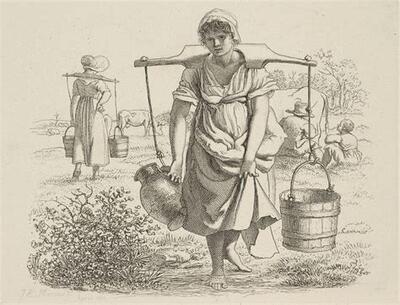
Water can extract some of the flavor from the wood in the same way that it can absorb some of the taste of plastic or tin. This can quickly make the water taste stale. If you mix it with something, that already has a strong taste on its own (like vinegar, wine, beer, or spirits) it becomes considerably more enjoyable - vinegar, spirits, and some wines can be stored in wooden containers for a long time.
This is especially important when you are on a ship at sea in the modern period.
Hence,, rum and gin were
very often mixed into nearly everything the sailors drank — the water in the barrels
simply turned stale, which doesn’t taste good.
However, the availability of liquor, especially if it was mixed into most of your daily water-intake could
lead to some sort of alcoholism - and born was the stereotype of the drunken seamen and
for this, we have very much evidence though that does not mean that every sailor
was constantly, on a daily basis drunk!
Health
This might sound weird, but some people consider certain alcoholic beverages
healthy if consumed in certain situations or in small amounts.
Spices were seen as beneficial and attributed healing properties for some
sicknesses, so spiced wines and beer were sometimes recommended for sick people.
Some, especially Roman writers in antiquity, viewed a small amount of wine mixed with water as invigorating and good for longevity.

Certain wines were viewed as beneficial for mood and humor on certain days for certain people (medicine was still very much personalized: Astrology, astronomy, and birth signs were usually considered). In fact, some of the nobility had their personal master-of-wines whose sole job was to figure out which wine was appropriate for which days.
Imagine accidentally drinking an off-dry, savory wine with a floral note at a festival
on the 23rd of March, when you’re a Pisces! The horror and the negative consequences
on your body and mind could be tremendous!
Of course, most people didn’t think that; usually it was viewed as invigorating and good for your mood
if you drank the right wine on a
given day, depending on your birth sign and humor.
However, the master of wine was a very important and prestigious position.
Of course, this could also go in the opposite direction; some doctors have recommended to drink only water during certain seasons.
Hildegard von Bingen even wrote in her Physica Sacra:
It is more healthful and sane for a thirsty person to drink water, rather than wine, to quench his thirst
however:
One whose lungs ail in any way should not drink water, since it produces mucus around the lungs … Beer does not harm him much, because it has been boiled.
But she also stresses that one should be careful with water if you are not sure about the quality of water. People in the past had all kinds of opinions and ideas based on observations about what kind of water is the best to drink, which might be harmful, when it might be harmful and so on. Part of it was based on the four humors, part of it was based on what kind of water had the best quality (rain water vs running water vs. standing spring water vs … ).
On the other hand, even higher percentage spirits which slowly started to spread in the late Middle Ages in Europe (though Albertus Magnus already wrote about the process) were started to be viewed as positive:
It eases the diseases coming of cold. Comforts the heart. Heals all old and new sores on the bead. Causes a good color in a person. Heals baldness and causes the hair well to grow, and kills lice and fleas. It cures lethargy. Cotton wet in the same time and a little wrung out again and so put in the ears at night going to bed, and a little drunk thereof, is of good against all deafness
as Hieronymus Brunschwig in the 15th century wrote, who claimed that it also improved your mouth odor, gut health, chest pain, and so on.
Calories
While wine was attributed more often with positive health benefits
beer and ale were partly considered good because of the calories they provided.
A medieval person working all day long would burn a lot of calories. Common estimations
range between 3000-4000 kcal for a medieval peasant, so some extra calories, especially
if they were easily drinkable and tasty were pretty convenient.
Pleasure
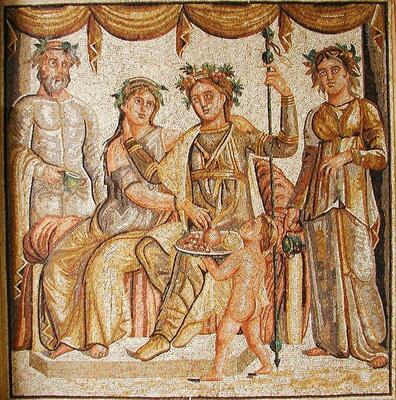
Of course, we can’t deny that many people like to get drunk.
While liquor with a high alcohol percentage wasn’t available for most of the past,
at least not in Europe, people could still got drunk on wine and beer.
I don’t think I have to go into detail here, since this is probably the most
relatable for many people here.
However, it is important to mention that if you partied close to higher class people than you, you might want to be careful when being drunk — saying the wrong thing to the wrong person could have horrible consequences. This was also true for noblemen attending a festivity of someone higher status than them.
Beer and Wine Production
Beer and ale, the most widely available alcoholic beverages for the common people was often brewed at home; in fact, it was viewed for large parts of the high to late middle ages, as well as the early modern period, one of the housewife’s duties.
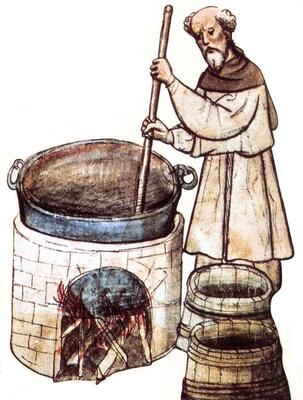
Monks, especially in their monasteries, were another huge factor in beer and wine production. They often had very strict rules on the quality of water as well as the ingredients in their beer. They codified them and wrote them down from the 14th century onward. (The Reinheitsgebot of the early modern period is only the most famous one and became widely accepted - local rules were far more common during the Middle Ages).
Rules regarding which kind of water to use varied heavily but generally followed the same ideas as before with the healthy benefits of various kinds of water sources: running, standing, spring, brook, etc. water.
In medieval England, there were even people tasked with walking from alehouse to alehouse to check on the quality of the beer that was brewed there (alehouses would usually brew their own beer) - breweries ran by monks usually were under the jurisdiction of the ecclesiastical law.
One reason that might explain why monks are often associated with brewing beer in the Anglosphere are the Rules of St. Benedict, which, among others, restricted the amount of food and wine a monk was allowed to consume:
1 Everyone has his own gift from God, one this and another that (1 Cor 7:7).
2 It is, therefore, with some uneasiness that we specify the amount of food and drink for others.
3 However, with due regard for the infirmities of the sick, we believe that a half bottle of wine a day is sufficient for each.
4 But those to whom God gives the strength to abstain must know that they will earn their own reward.
5 The superior will determine when local conditions, work or the summer heat indicates the need for a greater amount. He must, in any case, take great care lest excess or drunkenness creep in.
6 We read that monks should not drink wine at all, but since the monks of our day cannot be convinced of this, let us at least agree to drink moderately, and not to the point of excess,
7 for wine makes even wise men go astray (Sir 19:2).
8 However, where local circumstances dictate an amount much less than what is stipulated above, or even none at all, those who live there should bless God and not grumble.
9 Above all else we admonish them to refrain from grumbling.
Though generally monks were, and still are, also associated with brewing wine in southern Europe. Some monasteries extended these rules to beer too, since they didn’t accept abusing loopholes like this, and some monasteries actually increased their beer consumption during times of fasting.
Moreover, many wineries were run by monks. Monasteries often tried to be self-reliant
to a certain degree. Couple this with a strict work ethic, and you get a large production
of alcoholic beverages among others.
And don’t forget the importance of wine in Christian liturgy.
Closing Thoughts
I always find it odd (well, I roughly know why) that this supposed alcoholism in the past is often attributed solely to the medieval period, sometimes perhaps even to the early modern period but not so much to antiquity. We don’t hear about drunk Mesopotamians (who gave a lot of importance to the communal drinking of beer, as far as we know), Romans (though their supposedly decadent parties are sometimes mentioned), Scythians, and so on.
And we never hear about why this was supposedly a problem solely in medieval or early modern Europe but not during the Roman and Greek antiquity (almost as if people think that aqueduct provided fresh running water to every corner of the Roman Empire), they seemingly ignore pretty much every other part of the world (what about North Africa, the Middle East, medieval China and Japan, South East Asia, India, the Native Americans, etc …?)
Nowadays, it is so simple to get fresh and clear water with little to no effort, store it in glass bottles for months with only minimal changes in the taste and quality that we often forget about simple questions like
- How much effort did it take to get fresh water?
- What did they drink if they wanted something sweeter, spicier, something more refreshing or if they wanted to get drunk?
- How did they store water?
and many more. Everyday people had everyday problems and getting drunk every single day certainly wasn’t one of those for the vast majority of people.
Drunk people don’t design and build cathedrals that still stand after centuries, they don’t create such intricate relievio by hand on rings that you have to use magnifying glasses to see them, do such intricate stitching and sewing that outshine the quality and ‘artistry’ of modern machine-made clothes by magnitudes - one could continue this list for a long time.
They simply had, in some respects, fewer options when it came to drinking. Fresh fruits weren’t available all year around, and their juices couldn’t be stored for an entire year, soft drinks didn’t exist, and getting clean water took time and effort.
Did people on average drink more beer and wine than modern people? Maybe. We don’t have that much hard evidence, usually only the inventories and bills of parties and festivities, but that does not count into the average life of the average person.
Maybe people drank beer more often in the morning to carb-load before
work (imagine doing that when you have an office job and need to drive there).
Some people in the 18th century in some places were commenting on how coffee replaced
beer in some people’s morning routine.
In the more rural areas in the German speaking
regions a bottle of beer was sometimes part of lunch up until the 20th century.
But to insinuate that people were constantly drunk is just absurd and just pure
ignorance.
Peasants up to the 20th century had to do some work on pretty much most days (you can’t just
not feed your animals for a day or two), and certain times where they had to work
intensively every day (harvesting time in summer which was a very short time period
with lots of work) so being hungover every Saturday as some students (and some
office workers, I reckon) wasn’t really an option.
Perhaps the situation was
different for students in the universities from the medieval era onward, perhaps
it wasn’t — we don’t really know for a fact.
Either way, alcohol did play an important part in society in the past, at least in Europe, not for getting drunk but also for taste and healthcare.